
Best Practices: Early Learning – Leading Pre-K-3 Learning Communities
Webinars
 The Nuts and Bolts of ESSA Series: What Principals Need to Know to Support High Quality Early Childhood Education and Leadership
The Nuts and Bolts of ESSA Series: What Principals Need to Know to Support High Quality Early Childhood Education and Leadership
Presenters
Andrea Brinnel, Connecticut Office of Early Learning and NAECS-SDE Leadership Committee; and Kelly Pollitt, Chief Strategist, Policy and Alliances, NAESP
Description
The “Every Student Succeeds Act” (ESSA) recently signed into law provides an unprecedented opportunity to support high quality early childhood education and educators working in Pre-K-3, particularly with alignment of standards, curriculum and instruction. The law also acknowledges the important role of principal leadership in early childhood education and joint efforts across early learning settings and school-based contexts to address the needs of young children. This webinar presentation will identify specific areas of the new law that directly support early childhood education, and explore how states and districts can provide programmatic opportunities, including professional learning, to help facilitate collaborative efforts between principals, teachers, early childhood educators and related practitioners.
 ESSA Implementation: Leveraging State Opportunities to Support Principal Leadership
ESSA Implementation: Leveraging State Opportunities to Support Principal Leadership
Presenters
Robert Butts, Assistant Superintendent for Early Learning, Office of Superintendent of Public Instruction, State of Washington; Ron Sisson, Director of Principal Support and Elementary Programs, Association of Washington School Principals; and Moderator: Kelly Pollitt, Chief Strategist, Policy and Alliances, NAESP
Description
The passage of the nation’s largest federal education law, the Every Student Succeeds Act (ESSA), shifts significant authority to the state and local levels in order to identify and target resources to support effective educators. ESSA is informed by over a decade of research and practice, which now underscores the importance of principal leadership. Evidence shows that effective principals and other school leaders are second only to teaching quality when considering school-based factors that contribute to student learning. As we move into ESSA implementation, states and local districts are faced with both challenges and opportunities to plan comprehensive reforms that include systemic support for principals and other school leaders. This presentation will provide an overview of the new law and how it supports states and districts to improve principal quality, as well as the latest research and analysis that shows investing in principal preparation and development are evidence-based strategies. State policymakers and representatives from the State of Washington will share how they are working to reorient state efforts to take advantage of the opportunities to support principals and improve student and related outcomes. Attendees will gain knowledge around specific strategies that may be a part of any state’s ESSA plan, and how to ensure that the new law’s implementation will recognize, value and support the role of principals as the catalysts for reform.
Articles from Principal Magazine
 Principal Principal September/October 2016:
Principal Principal September/October 2016:
“The Journey to Mastery”

How competency-based learning creates personalized pathways to success for young learners. By Bob Sornson.
Read the article.
Other NAESP Resources
The Principal’s Office July 27th, 2016:
“Tips to Make Early Childhood Transitional Programs Work”
When students enter early childhood education programs for the first time, transition supports can help them be successful. By Julie Bloss.
Read the blog post.
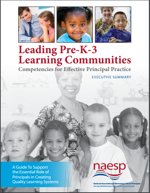 Leading Pre-K-3 Learning Communities: Competencies for Effective Principal Practice
Leading Pre-K-3 Learning Communities: Competencies for Effective Principal Practice

As the federal role expands to support increased state investments in school-based prekindergarten programs, NAESP has released an updated, principal competency guide: Leading Pre-K-3 Learning Communities: Competencies for Effective Principal Practice. Developed by a panel of leading practitioners, this standards document defines new competencies, and outlines a practical approach to high-quality early childhood education that is critical to laying a strong foundation for learning for young children from age three to grade three, or Pre-K-3.
More information on this publication.
NAESP Conference Presentations
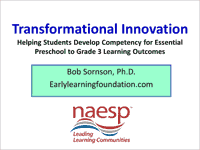 Transformational Innovation: Helping Students Develop Competency for Essential Preschool to Grade 3 Learning Outcomes
Transformational Innovation: Helping Students Develop Competency for Essential Preschool to Grade 3 Learning Outcomes

Primary Presenter
Bob Sornson, PhD - Early Learning Foundation
Description
When learning outcomes are crucial, covering the content is not enough. During the early childhood learning years, PK to Grade 3, a child’s experience sets the trajectory of learning for life. It’s past time for transformational change in the way we design and deliver instruction to all our students, and especially our most vulnerable students. Learn to identify essential learning outcomes in all the domains of early childhood, and build solid pathways to lifelong learning success.
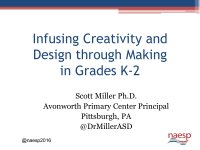 Infusing Creativity and Design through “Making” in Grades K-2
Infusing Creativity and Design through “Making” in Grades K-2

Primary Presenter
Scott Miller - Avonworth School District
Description
An overview of how to infuse making and design into the K-2 classroom, how to design meaningful experiences that focus on the creative problem-solving process, and how to build a culture that supports creativity and innovation through professional development. Participants will leave with strategies to implement making, literature, and technology.
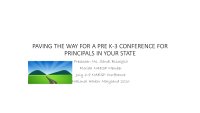 ‘Paving The Way’ for a PreK-3 Conference for Principals In your State
‘Paving The Way’ for a PreK-3 Conference for Principals In your State

Primary Presenter
Sandi Bisceglia, MS Ed Leadership; MS Elem. Ed - NAESP/FAEMSP
Description
This session is intended to provide State Association Principal Leaders, District Leaders, and those who plan PD for principals with an overview of how to design, plan, collaborate, and execute a” Drive In Conference” in their State specifically focused on providing a training opportunity targeting principals of early learning programs.
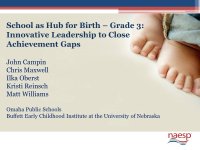 School as Hub for Birth through Grade 3: Innovative Leadership to Close Achievement Gaps
School as Hub for Birth through Grade 3: Innovative Leadership to Close Achievement Gaps

Primary Presenter
Christine Maxwell, PhD - Buffett Early Childhood Institute; John Campin, M.S. - Omaha Public Schools; and Ilka Oberst, M.S. - Liberty Elementary, Omaha Public Schools
Description
Metro Omaha districts and the Buffett Early Childhood Institute are partnering to end achievement gaps by starting early. Schools serve as hubs for high-quality early childhood education and family engagement from birth onwards. Principals discuss the promise of this collaborative birth through third grade approach, exploring leadership strategies and challenges.
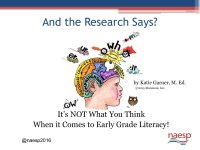 Hacking the Brain: Easy, Accelerated (and Earlier!) Learning
Hacking the Brain: Easy, Accelerated (and Earlier!) Learning

Primary Presenter
Katie Garner, M. Ed. Primary/Reading - Learning & the Brain Research Consortium; The Juilliard School- CLIMB
Description
“Learning-disabled” or “teacher-disabled?” Research suggests that poor readers read poorly because they are taught poorly at the earliest grade levels. It is imperative that elementary school leaders understand the importance of expert literacy instruction at the earliest grades if we are to catch our most vulnerable learners BEFORE they fall! The current trends and advances in brain-based research—specifically that which targets the affective (social-emotive) learning domain— speak loud and clear to today’s teachers, but it is up to school administrators to ensure the message is heard!
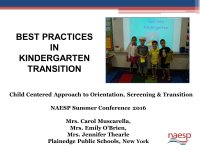 Best Practices in Kindergarten Transition- A Child-centered Approach to Orientation, Screening and Transition
Best Practices in Kindergarten Transition- A Child-centered Approach to Orientation, Screening and Transition

Primary Presenter
Carol F. Muscarella, MA, SBL, SDL - Plainedge School District; Emily S. O’Brien, MA, SBL, SDL - Plainedge Public Schools; and Jennifer Thearle, MA, SBL, SDL - Plainedge Public Schools
Description
Research indicates that kindergarten is the place in which children make important conclusions about school and about themselves as learners. Participants will learn about how the Plainedge School District changed their kindergarten orientation and screening programs based on research to create a best practice approach for a successful kindergarten transition.
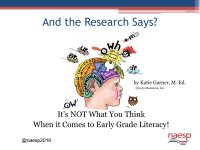 And the Research Says? It’s NOT What You Think When It Comes to Early Literacy!
And the Research Says? It’s NOT What You Think When It Comes to Early Literacy!

Primary Presenter
Katie Garner, M. Ed. Primary/Reading - Learning & the Brain Research Consortium; The Juilliard School- CLIMB
Description
“Learning-disabled” or “teacher-disabled?” Research suggests that poor readers read poorly because they are taught poorly at the earliest grades, and the keys to solving this problem lie in brain research on the affective learning domain. Understanding both the problem and solution is essential to catching vulnerable readers BEFORE they fall!
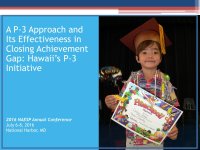 A P-3 Approach and Its Effectiveness in Closing Achievement Gap: Hawaii’s P-3 Initiative
A P-3 Approach and Its Effectiveness in Closing Achievement Gap: Hawaii’s P-3 Initiative

Primary Presenters
Kim H. Guieb, M.S. - Hawaii P-20 Partnerships for Education; Karen Lee, Ed.D. - Hawaii P-20 Partnerships for Education; and GG Weisenfeld, Ed.D. - Hawaii P-20 Partnerships for Education
Description
Hawaii P-20 launched five P-3 demonstration communities throughout under-served regions in our state, as well as worked on high-profile statewide projects from 2009-2014. A final evaluation report from an external evaluator showed a statistically significant improvement in third grade reading scores in the five communities, narrowing of the achievement gap.
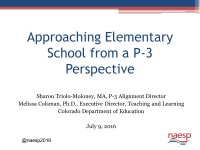 Lessons Learned from P-3 Alignment in Colorado Schools
Lessons Learned from P-3 Alignment in Colorado Schools

Primary Presenter
Sharon L. Triolo-Moloney, MA - Colorado Department of Education andMelissa Colsman, PhD - Colorado Department of Education
Description
NAESP’s “Leading Pre-K-3 Learning Communities” document, was used by teams in Colorado to assess current P-3 practices and plan next steps. This session will review lessons learned, provide examples of what P-3 alignment looks like, and discuss the vital role of a principal-led collaborative leadership team.